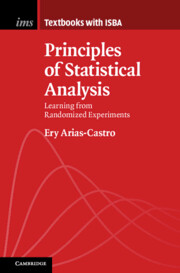Book contents
- Frontmatter
- Dedication
- Frontmatter
- Contents
- Preface
- Acknowledgements
- Part I Elements of Probability Theory
- 1 Axioms of Probability Theory
- 2 Discrete Probability Spaces
- 3 Distributions on the Real Line
- 4 Discrete Distributions
- 5 Continuous Distributions
- 6 Multivariate Distributions
- 7 Expectation and Concentration
- 8 Convergence of Random Variables
- 9 Stochastic Processes
- Part II Practical Considerations
- Part III Elements of Statistical Inference
- References
- Index
8 - Convergence of Random Variables
from Part I - Elements of Probability Theory
Published online by Cambridge University Press: 22 July 2022
- Frontmatter
- Dedication
- Frontmatter
- Contents
- Preface
- Acknowledgements
- Part I Elements of Probability Theory
- 1 Axioms of Probability Theory
- 2 Discrete Probability Spaces
- 3 Distributions on the Real Line
- 4 Discrete Distributions
- 5 Continuous Distributions
- 6 Multivariate Distributions
- 7 Expectation and Concentration
- 8 Convergence of Random Variables
- 9 Stochastic Processes
- Part II Practical Considerations
- Part III Elements of Statistical Inference
- References
- Index
Summary
An empirical average will converge, in some sense, to the corresponding expectation. This famous result, called the Law of Large Numbers, can be anticipated based on the concentration inequalities introduced in the previous chapter, but some appropriate notions of convergence for random variables need to be defined in order to make a rigorous statement. Beyond mere convergence, the fluctuations of an empirical average around the associated expectation can be characterized by the Central Limit Theorem, and are known to be Gaussian in some asymptotic sense. The chapter also discusses the limit of extremes such as the maximum of a sample.
- Type
- Chapter
- Information
- Principles of Statistical AnalysisLearning from Randomized Experiments, pp. 100 - 112Publisher: Cambridge University PressPrint publication year: 2022

